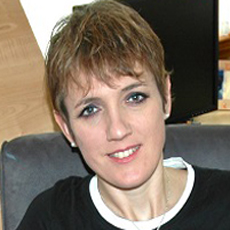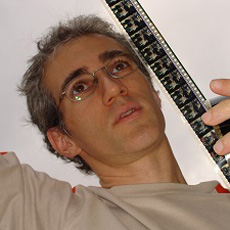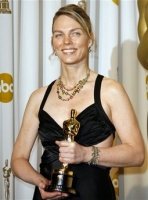 Yesterday at the 79th Academy Awards, Torill Kove was awarded the Best Animated Short Oscar for The Danish Poet, a film she directed, wrote and co-animated. The event marked the second time that Torill has received attention in the Animated Short category, as her previous directorial effort, My Grandmother Ironed The King’s Shirts, was nominated for an Oscar in 2000.
Yesterday at the 79th Academy Awards, Torill Kove was awarded the Best Animated Short Oscar for The Danish Poet, a film she directed, wrote and co-animated. The event marked the second time that Torill has received attention in the Animated Short category, as her previous directorial effort, My Grandmother Ironed The King’s Shirts, was nominated for an Oscar in 2000.
As explained in its official synopsis, The Danish Poet follows “Kasper, a poet whose creative well has run dry, on a holiday to Norway to meet the famous writer, Sigrid Undset. As Kasper’s quest for inspiration unfolds, it appears that a spell of bad weather, an angry dog, slippery barn planks, a careless postman, hungry goats and other seemingly unrelated factors might play important roles in the big scheme of things after all.”
Days before the Oscar ceremony, Animated News & Views’ Josh Armstrong had the pleasure of speaking with Kove. During the conversation, the artist elaborated on the making of Poet, while also recalling her start in filmmaking. Furthermore, she was kind enough to provide some thoughts regarding her future in animation.
(Before one reads the interview, it is highly recommended that he or she view The Danish Poet, now available at iTunes.)
Animated Views: When did you decide that you wanted a career in animation?
Torill Kove: I don’t really think that I had the wherewithal to decide that it was going to be a career. I think that I just kind of started learning how to do animation. It was in ’94 or ’93, maybe. Might have been in ’93. I was just drawn to it, because it’s a nice combination of storytelling and drawing that appealed to me.
AV: How did you become involved with the National Film Board of Canada?
TK: I was taking a course at the animation school at the Concordia University in Montréal. A lot of people who teach there often also make films for the Film Board. So, I met a couple of directors, in the animation school. When I had finished my first year of animation, there was somebody at the Film Board who needed an assistant on his film. He needed a tracer, basically, for a 3- to 4-year contract at the Film Board.
So, I got that job. When I finished that one, there were other assistant jobs that came up. Then, I wrote a script, pitched it and got to make a couple of films.
AV: How long did it take to create The Danish Poet?
TK: I can’t really remember when it started. You know how these are, you start by writing the script, and then it seems to take forever before it gets anywhere. Then, there’s the whole sort of getting the thing into production.
But I think the actual production work of it took three years. In those three years, there was a one-year period in which not much got done, because I was on maternal leave. So, three years is probably what it took altogether.
AV: What would you say was your biggest challenge in working on the short?
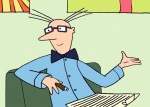 TK: I think probably the biggest challenge was at the very end, in the editing, because I hadn’t planned the film well enough with a guide track. So, in the end, there was a bit of a mismatch between the amount of voiceover I had and the amount of picture I had. I found that was actually really challenging. Luckily, I had a really good editor – more like an editing team, actually – but also a really good editor. So, that was difficult.
TK: I think probably the biggest challenge was at the very end, in the editing, because I hadn’t planned the film well enough with a guide track. So, in the end, there was a bit of a mismatch between the amount of voiceover I had and the amount of picture I had. I found that was actually really challenging. Luckily, I had a really good editor – more like an editing team, actually – but also a really good editor. So, that was difficult.
I had anticipated that it was going to be difficult to have so many different people working on the animation. I had a couple of people in Norway and then a couple of animators here in Montréal. But that actually turned out to be a walk in the park. I had really good animators, and that made that part actually quite easy.
AV: How much of The Danish Poet did you animate yourself?
TK: I think we had originally divided it up about 50/50, so that I did half of it and then the assistant did half of it. That was the plan. Whether or not that’s actually what the outcome was, I’m not quite sure. But I would say about half of it.
AV: Which do you prefer: animating, writing or directing?
TK: You know what, I like all of them. Actually, what I prefer is to be able to do all three of those things. They’re very different tasks. I like all of them, but I like variety. So I can’t really pick out a single one of those. I like all of them.
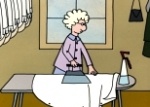 AV: Both The Danish Poet and your previous short film, My Grandmother Ironed The King’s Shirts, contain a certain style of traditional animation. What attracts you to this style?
AV: Both The Danish Poet and your previous short film, My Grandmother Ironed The King’s Shirts, contain a certain style of traditional animation. What attracts you to this style?
TK: I think it’s quite simply that it’s the only one I know how to do. I don’t know how to animate any other way, at the moment. I don’t know Flash. I don’t know the first thing about computer generated imagery. It’s just what I do.
I’m not necessarily married to the idea, as if it would have to be like that for the rest of my life. That’s just how I learned, and that’s how I do it. It’s not a style that I pick among many different styles. It’s just the way that I do it.
AV: What draws you to animation rather than live-action?
TK: I think it’s a completely different process. I’ve never actually considered doing live-action. It’s something that I’ve never really been interested in doing. I think I might one day try to make a documentary; I think I’m more interested in that. But I like to write, and I like to draw. Because of those two interests, animation appeals to me.
 AV: How did Liv Ullmann become the narrator for The Danish Poet?
AV: How did Liv Ullmann become the narrator for The Danish Poet?
TK: Well, I wanted to have a voice that just sounded Scandinavian. We kept coming back to her, because she’s known – in Norway, at least – for speaking both Norwegian and English, with a bit of an accent. I liked the idea of a person doing both the Norwegian version and the English version. I always liked her voice, and I just thought that her delivery would be right for the story. So, we asked her, and she said yes. It was actually that simple.
AV: Why did you decide for the short to be narrated, rather than for the characters to speak dialogue with the voices of different actors?
TK: I think it’s just sort of a style choice. I like it when it’s like that. I mean, it’s already kind of a busy film. There are a lot of characters involved. There’s a lot of voiceover. I thought it would keep it simpler to just have the same voice do the characters.
AV: Were there any concepts or scenes deleted from The Danish Poet?
TK: Yes, actually there were a few that didn’t make it. In the beginning, in the library, there was a whole background subplot going on, with a man standing near the shelves and a book falls on his head. These ambulance people come out of nowhere, with a stretcher, and they carry him out. We tried to cut it in. People didn’t really get it, or they thought it was too confusing. So, we took it out. That’s primarily the main thing that didn’t make it.
Another thing that didn’t make it was an animated camera move, also in the library. Sort of Kasper’s point of view as he’s walking down the aisle, past the shelves. It was just really, really difficult to make it look right. So, we had to ditch it. Those are really the only two [deleted scenes] I can think of.
 AV: Speaking of the library, we see many different book titles, particularly when Kasper discovers Kristin Lavransdatte. Is there any significance in those titles shown?
AV: Speaking of the library, we see many different book titles, particularly when Kasper discovers Kristin Lavransdatte. Is there any significance in those titles shown?
TK: Not really. It’s just a stack – a row – of books. It’s supposed to be the travel section of Norway. There’s nothing there that’s actually significant in any way. I mean, if you can’t speak Norwegian, you’re not missing anything by not being able to read those. They’re just titles like Mountains & Fjords and Cooking with Fish. That kind of thing – slightly humorous but nothing really significant.
AV: Are there any inside jokes or references that folks should look for, in The Danish Poet?
TK: There are a couple of in-jokes. The fact that Scandinavians are a little confused about where famous people come from – that’s a bit of an in-joke. But I think that’s also kind of an international joke. For example, a lot of people think Liv Ullmann is Swedish, when in fact, she is Norwegian. Lately, a lot of people think I’m Danish.
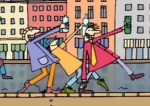 The business about the drunk people coming out of a ferry – I think that’s also a bit of an in-joke, although people who have traveled in Scandinavia tell me that ferries are like that all over Scandinavia. It’s not just the ferry that goes between Oslo and Copenhagen.
The business about the drunk people coming out of a ferry – I think that’s also a bit of an in-joke, although people who have traveled in Scandinavia tell me that ferries are like that all over Scandinavia. It’s not just the ferry that goes between Oslo and Copenhagen.
My hope is that even though those jokes are in-jokes, people will get them anyway. I have the impression that they do.
AV: Of all the possible authors and literature, why did you choose for Sigrid Undset and her Kristin Lavransdatter to play such important parts in the short?
TK: A couple of reasons. First of all, I think Kristin Lavransdatter is the quintessential Norwegian romantic medieval trilogy. It’s epic in nature. There are just tons and tons of stuff going on in it, and it spans a whole generation.
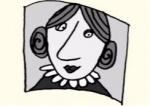 I also chose it because the choice that the protagonist in Kristin Lavransdatter makes is one of those choices that’s so common, it’s banal: you end up marrying the wrong person, because you were head-over-heels in love. There was another man who was probably better suited that she [Kristin Lavransdatter] didn’t choose, because he wasn’t as exciting. I think there’s something about that idea that I find kind of funny. I think it is something that is really familiar to people. I wanted to use a watered-down version of that plot in my story. So, that’s one reason.
I also chose it because the choice that the protagonist in Kristin Lavransdatter makes is one of those choices that’s so common, it’s banal: you end up marrying the wrong person, because you were head-over-heels in love. There was another man who was probably better suited that she [Kristin Lavransdatter] didn’t choose, because he wasn’t as exciting. I think there’s something about that idea that I find kind of funny. I think it is something that is really familiar to people. I wanted to use a watered-down version of that plot in my story. So, that’s one reason.
Another reason is that it is actually a book that’s fairly well-known outside of Norway. I’m amazed by how many people I meet who have actually read it, in Canada and in the States. [Sigrid Undset] is very famous in Scandinavia. I guess those were the main reasons.
AV: Is the main character, Kasper Urgenson, based on anyone in particular?
TK: No, he isn’t. I think there’s a little bit of me in him. But other than that, no.
AV: Have you found that The Danish Poet is received differently in various countries? Do all countries where you’ve screened the short seem to embrace it?
TK: I haven’t been present in a lot of screenings – in Scandinavia, for example. I haven’t been able to travel with the film to a lot of festivals. So, it’s hard to know.
I did go to a festival in Norway. In terms of how much the audience enjoys it, it’s hard to tell. I think Norwegians are just kind of quieter by nature. But I think that Norwegians probably will interpret the film differently.
Because I’m a Norwegian who doesn’t live in Norway, it might come across like I’m an exile who’s kind of poking a bit of fun at my home country – which I am, but it’s not in any way meant to be malicious or arrogant or any of those things. Even though I’ve been away from Norway for a long time, there’s still a lot of Norwegian-ness in me. But since I’ve been away for 20 years, the memories that I have of Norway and the knowledge I have of that country are basically 20 years old.
So, maybe Norwegians just don’t find it quite as engaging or quite as funny. My impression is that it could also be that I have just been at more North American screenings. But maybe the film resonates more with people outside of Norway.
AV: How did you find out that The Danish Poet had been Oscar-nominated for Best Animated Short?
TK: Actually, a friend of mine in L.A. was at the announcement. He called me as soon as he knew. That’s how I found out. When he called, I was glued to my computer screen, trying to see if anything had been posted online. He called me almost right away.
AV: Were you shocked, or was the nomination somewhat expected?
TK: It wasn’t completely unexpected, because I knew I was shortlisted. I knew that I had like a 1-in-10 chance of being nominated, which are pretty good odds actually. On the other hand, I had seen all the other films that were shortlisted. I just didn’t really think that mine would cut it.
I figured that the major studios, like Pixar, Disney, DreamWorks, Blur and Blue Sky, all had really strong films. I felt for sure that they would have to nominate at least two or three of those. Then, among the films that came from independent filmmakers, there were films I was pretty sure would get a nomination. Mine wasn’t necessarily on that list. So, I was surprised. I really hadn’t expected it, so in essence, I was surprised.
AV: Could you provide any details on your next project?
TK: I don’t really have any details on my next project yet. I’m just kind of in the writing process; I haven’t pitched anything yet. I think it might end up having something to do with interactions between parents and young children, which is a very broad topic, but I can’t really narrow it down any more than that at the moment. Also, I could very easily change my mind and do something else. So, you never know.
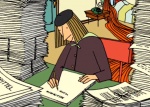 AV: Have you considered doing an animated movie?
AV: Have you considered doing an animated movie?
TK: I’m not really attracted to that, to tell you the truth. It just seems like a completely different process in many ways. I think it requires skills that I’m not sure I have. For the time being, I’m really happy just working with a short format.
AV: What message do you most want audiences to take from The Danish Poet?
TK: I’m not sure if there’s any particular thing I want the audience to think. I’d like them to walk away thinking it’s a film that can be interpreted in more than one way. I’m happy when I hear from people who’ve seen the short that it makes them think about the kind of strangeness where we find inspiration for art and where we find love, and the kind of miraculousness of just being alive and having a life. I’m pleased when people get that out of it.
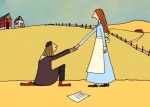 AV: What advice would you like to offer anyone wanting to work in animation?
AV: What advice would you like to offer anyone wanting to work in animation?
TK: I always say, write your own stories. But that’s just my personal bias. I think it’s really nice to see people bring their own stories to the screen. I say that because that’s what I enjoy doing.
Even if it’s not your own story, make sure you really like the story, because you’re going to be stuck with it for a long time in the production process. That’s probably the advice I’d give. Try to write your own story; then at least you’ll have something you really feel strongly about.
The Animated News & Views team sends its sincerest thanks to Torill Kove for participating in the interview. Congratulations on your Oscar win, Torill! Likewise, thanks to Winston Emano for arranging the conversation.




